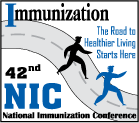
|
|
CDC NIP/NIC Home Page
|
Tuesday, March 18, 2008 - 2:25 PM
57
Enhancing Childhood Immunization Practices Through Partnership: Collaboration of the Oregon Rural Practice-based Research Network and the State of Oregon Immunization Program
Lyle J. Fagnan1, James A. Gaudino2, Scott Shipman3, Andrew Sussman4, Jo Mahler5, Jennifer Holub6, Nathan Crawford7, Sara Beaudrault8, and Lisa Luna8. (1) Oregon Health & Science University, 3181 SW Sam Jackson Park Road, L222, Portland, OR, USA, (2) Oregon Immunization Program, State of Oregon Department of Human Services, 800 NE Oregon Street, Suite 370, Portland, OR, USA, (3) The Dartmouth Institute for Health Policy and Clinical Practice, Dartmouth-Hitchcock Medical Center, HB 7251, 35 Centerra Parkway, Lebanon, NH, USA, (4) Department of Family and Community Medicine, University of New Mexico, 1 University of New Mexico, MSC09 5040, Albuquerque, NM, USA, (5) Oregon Rural Practice-based Research Network, Oregon Health & Science University, 3181 SW Sam Jackson Park Road, L222, Portland, OR, USA, (6) Clinical Outcomes Research Initiative, Oregon Health & Science University, 3181 SW Sam Jackson Park Road, Portland, OR, USA, (7) Immunization Services Division, Centers for Disease Control and Prevention, 1600 Clifton Road, MS E-52, Atlanta, GA, USA, (8) Oregon Immunization Program, Oregon Department of Human Services, 800 NE Oregon Street, Suite 370, Portland, OR, USA
Learning Objectives for this Presentation:
By the end of the presentation participants will be able to:
1. Recognize opportunities to engage practices in quality improvement programs through partnership of a Practice-Based Research Network and state immunization program.
2. Apply a participatory mixed-methods approach to understanding and describing childhood immunization practices.
Background:
Immunization quality improvement initiatives in primary care practices require a high level of engagement by the practice staff and clinicians. Practice-based research networks, such as Oregon Rural Practice-based Research Network (ORPRN), are well-positioned to partner with state immunization programs to engage practices in such quality improvement strategies.
Setting:
Rural Oregon
Population:
Primary care clinicians and practices that provide immunizations to children, ages 0 to 3 years of age.
Project Description:
The Rural Oregon Immunization Initiative (ROII) is a mixed-methods study with two primary objectives: 1) describe current immunization practices and opinions, 2) engage practices in implementing quality improvement activities. Data were collected in two phases: 1) quantitative statewide survey of rural primary care clinicians providing care to children ages 0 to 3 years, 2) quantitative and qualitative assessment of 11 rural practices (chart reviews; observations; interviews with clinicians clinic staff, parents, and county health personnel). A written practice-specific report of the Phase 1 and 2 results was developed, and then presented and discussed in person with each Phase 2 practice. A state immunization program health educator next presented practice-specific immunization rates and discussed the opportunity to participate in the state immunization quality improvement program, AFIX (Assessment, Feedback, Incentives, and Exchange).
Results/Lessons Learned:
All Phase 2 practices receiving in-person presentations of practice-specific reports and their rates decided to engage in the AFIX program. A partnership that combines the expertise and resources of the state immunization program with the practice-based research network, ORPRN, suggests considerable potential to engage practices in improving childhood immunization practices.
See more of Quality Improvement Strategies and Tools 2
See more of The 42nd National Immunization Conference (NIC)
See more of The 42nd National Immunization Conference (NIC)